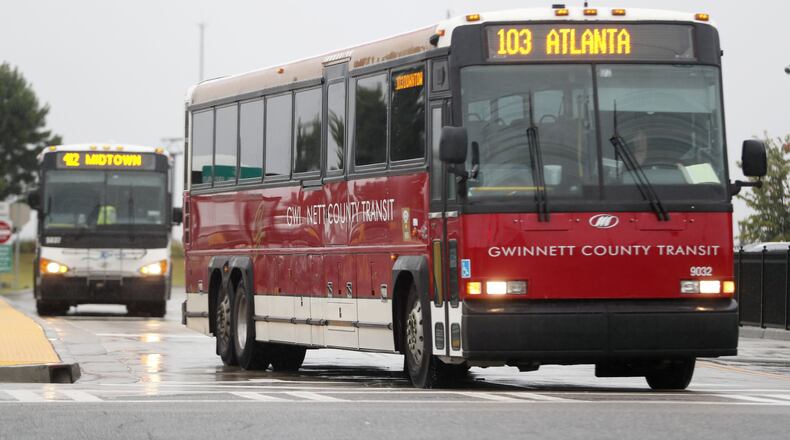Gwinnett County voters this fall will have another chance to expand transit in the county, after rejecting a proposal last spring.
County commissioners in a 4-1 vote on Tuesday agreed to put a transit vote on the ballot for the second time in two years.
This proposal is different from the one voters rejected in March 2019 in a number of ways. For one, MARTA would only be responsible for running a heavy rail extension that would go from Doraville to a planned transit hub at Jimmy Carter Boulevard. In the failed referendum, MARTA would have run the whole system.
Additionally, the proposal voters will consider this fall adds more connections to parts of the county that would have had no or limited service under the 2019 plan, and moves the completion dates of some projects earlier in the timeline, so voters can see results sooner.
“It’s a different plan and a different contract,” Commissioner Ben Ku said. “It’s important to put it on a November presidential election ballot when we can get a majority of Gwinnettians to weigh in on this very important issue.”
The decision comes after months of agonizing about what voters might want, and if they would prefer a transit system that wasn’t run by MARTA.
Using the new Atlanta-Region Transit Link Authority, or ATL Board, the county will seek a 30-year penny sales tax that would begin April 21, if approved by voters. It would raise $12.2 billion to extend MARTA’s heavy rail into the county and allow Gwinnett to develop and operate a transit system with four bus rapid transit lines, seven arterial rapid transit lines and nearly two dozen local bus lines. It would also include express and commuter bus routes, expanded paratransit service and flex zones in areas of the county that don’t have regular service.
A long-term plan would include the extension of MARTA service to the Infinite Energy Center, but that is not included in the current proposal.
Gwinnett will be the first county to go to voters with the new ATL tax since it was approved.
The lone vote against the proposal belonged to Commissioner Tommy Hunter, who has long said he was opposed to bringing a transit expansion to voters again. Tuesday, he said he thought it was unfair that government could harm the economy while requiring people to maintain social distance in response to the coronavirus pandemic, while taxing them to pay for something that would be used with people in close proximity to each other.
“I’m not going to argue at some point in time Gwinnett County is not going to need other options,” he said. “Right now is the wrong time.”
The ballot language for November reads:
Shall a special one (1%) percent sales and use tax be imposed in the special district consisting of Gwinnett County for a period of time not to exceed thirty (30) years and for the raising of funds for transit projects?
GWINNETT TRANSIT TIMELINE
March 19, 2019: Gwinnett voters reject a referendum that would have extended MARTA service into the county.
April 2019: State legislators defeated a provision that would have prevented Gwinnett from holding another transit referendum until 2026. A microtransit service that was tested in Snellville concluded.
October 2019: Gwinnett’s transit review committee held its first meeting. The group made suggestions about what any future transit proposals should include.
January 2020: Commissioner Ben Ku proposed a new transit plan, called GEM, to members of the transit review committee. Members of the group said Ku’s proposal came too late, and sent their own recommendations to the Board of Commissioners for consideration.
April 2020: Gwinnett commissioners approved a $6.7 billion list of projects they could send to voters, more than they could afford to build and operate.
May 2020: The Atlanta-Region Transit Link Authority approved Gwinnett’s project list.
June 2020: City leaders weighed in on Gwinnett’s proposed list of transit projects. After months of debate, county commissioners moved forward with a transit plan that would include heavy rail.
July 2020: The ATL Board again signed off on Gwinnett’s plan, including the extension of heavy rail.
July 21, 2020: Gwinnett commissioners voted 4-1 to put a new transit plan on the ballot in November.
About the Author
The Latest
Featured



